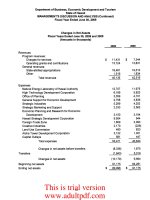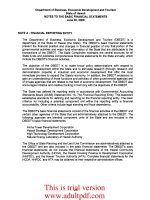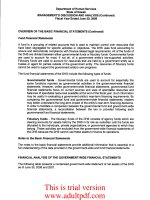FINANCIAL AUDIT OF THE DEPARTMENT OF HUMAN SERVICES STATE OF HAWAII Fiscal Year Ended June 30, 2009_part7 pot
Bạn đang xem bản rút gọn của tài liệu. Xem và tải ngay bản đầy đủ của tài liệu tại đây (339.13 KB, 11 trang )
Department
of
Human Services
State
of
Hawaii
SCHE;DULE
OF
FINDINGS AND QUESTIONED COSTS (Continued)
Fiscal Year Ended
June
30,
2009
Ref.
No. Internal Control Findings (Continued)
2009-04 Reconcile EBT Benefits Available and Cash Balance
The DHS contracts with JP Morgan Chase Treasury Services (JP Morgan) to provide
the Electronic Benefits Transfer (EBT) processing required to deliver cash assistance
and food stamp benefits under the assistance programs it administers. The
DHS
maintains two separate
"IP
Morgan accounts for the different assistance programs that
administers by the
DHS.
The DHS
is
responsible for determining the eligibility and the
amount of benefits to
be
provided to all participants and transmits this data to JP
Morgan. JP Morgan provides EBT debit cards to the DHS and makes the assistance
available via the participants' EBT cards. The DHS deposits authorized participant
benefits into a local bank account where they are held until withdrawn
by
JP Morgan
when the benefits are used
by
a participant. The cash available
in
the local bank
should be equal to the benefits available
on
the EBT cards per JP Morgan statements.
During our review, we noted that the DHS completed the reconciliation for one of the
"IP
Morgan accounts.
At June
30,
2009, benefits available per the JP Morgan statement were approximately
$137,000 less than the cash available
in
the local bank. The difference
is
likely due to
a timing difference between the time EBT cards
are
debited for benefits used
and
when funds are withdrawn by
"IP
Morgan. Other reasons for the difference could
be
benefits authorized and deposited for a participant
who
is
later terminated or to a EBT
card that has been canceled. However, since the reconciliation between JP Morgan's
records of the benefits available and the cash available
in
the local bank account was
only performed for one of the accounts, the DHS
is
uncertain if the nature of
all
of the
reconciling items have been identified.
Recommendation
The DHS should reconcile benefits available per the JP Morgan statement and the
cash balance
in
the local bank account
on
a monthly basis for both JP Morgan
accounts. The monthly reconciliation will ensure that the amounts due
to
individuals
have been properly recorded and supported.
67
This is trial version
www.adultpdf.com
Compliance and Internal Control Findings
Department
of
Human Services
State
of
Hawaii
SCHEDULE
OF
FINDINGS AND QUESTIONED COSTS (Continued)
Fiscal Year Ended June 30, 2009
SECTION
III
- FEDERAL AWARD FINDINGS AND QUESTIONED COSTS
Ref.
No.
2009-05 Improve Controls
over
Utilization, Fraud and Accuracy
of
Medicaid
Claims
Federal agency:
U.S.
Department of Health
and
Human Services
CFDA 93.778
Medical Assistance Program
The development and administration of the State's Medicaid Assistance
Program (MAP)
is
the responsibility of the Med-QUEST Division (MQD).
The DHS information retrieval and non-drug claims processing system
is
the Hawaii Prepaid Medical Management Information System
(HPMMIS). The HPMMIS
is
operated and maintained by the Arizona
Health Care Cost Containment System (AHCCCS).
In
addition, the
management and processing of the DHS's pharmacy benefits
is
contracted to Affiliated Computer Services, Inc. (ACS).
Due to the complexity of the Medicaid program operations and the large
volume of transactions, much reliance
is
placed on HPMMIS and its
system of internal controls to accurately maintain enrollment and
participant data and to ensure Medicaid costs are allowable, properly
coded and accurately paid. Title 42 CFR Part 456 Subpart A requires a
statewide program of control of the utilization of
all
Medicaid services.
During our review of internal controls, we noted that the primary
controls used to prevent unnecessary utilization of care
and
services
and to ensure proper and accurate payment of Medicaid claims were
front-end controls such as pre-payment edit functions contained
in
HPMMIS and
an
extensive list of medical services and procedures
which require prior authorization. However, we noted a lack of back-end
control activities such
as
a post payment review of a sample of
Medicaid claims or a review
of
utilization data for potentially fraudulent
or abusive activity. Furthermore, for certain back-end control activities
performed by the quality improvement organization (QID) formerly
known
as
peer review organization, we noted a lack
of
follow-up by the
DHS on findings and recommendations reported.
More specifically,
we
noted the following conditions:
• The Surveillance and Utilization Review Subsystem (SURS)
reports are still not being used to identify potential fraud or abuse.
Due
toa
lack of personnel, minimal resources were dedicated to
SURS review
as
SURS personnel were assigned to perform
68
Questioned
Costs
This is trial version
www.adultpdf.com
Ref.
No.
Department
of
Human Services
State
of
Hawaii
SCHEDULE OF FINDINGS AND QUESTIONED COSTS (Continued)
Fiscal Year Ended
June
30, 2009
Compliance and Internal
Control
Findings (Continued)
Questioned
Costs
2009-05 Improve Controls
over
Utilization, Fraud and Accuracy
of
Medicaid
Claims (Continued)
Payment Error Rate Measurement (PERM) audits and other rate
setting functions.
In
addition, there
is
a lack
of
meaningful, user-
friendly SURS reports needed to identify potential fraud and abuse
cases. As a result, there were no cases referred to the Medicaid
Fraud Control Unit (MFCU) which operates under the State Attorney
General's office based
on
the review of SURS reports. Any referrals
from the SURS unit
in
fiscal year 2009, originated from public phone
calls reporting potential fraud or abuse. The DHS continues to
be
in
noncompliance with Title 42 CFR Part 456.23, which requires the
DHS to have a post payment review process that allows DHS
personnel to review recipient utilization and provider service profiles
and exception criteria to identify and correct misutilization practices
of
recipients and providers.
• The DHS continues to be
in
noncompliance with Title 42 CFR Part
455.13 which requires the DHS to have methods for identification,
investigation, and referral of fraudulent activity. The Medicaid
Investigations Unit (MIU)
is
an
important component of this process.
In
the
past,
this unit was comprised of one individual
and
in
June 2008,
this individual retired from the DHS and to date the position remains
vacant. The DHS currently has almost no formal activities to identify
and investigate suspected fraud. As a result, referrals of potential
fraudulent activities to the MFCU only originate from complaints
received via the MOD phone
line.
Previous reviews performed
by
the
Centers for Medicare and Medicaid Services (CMS),
the
U.S.
federal
agency which administers the Medicaid program,
also
revealed a lack
of communication and coordination of efforts between the DHS and
MFCU. There appears to be no improvement
in
this condition.
• There
is
no
formal ongoing post payment review of a sample of claims.
It
has
been over six years since the last third party review was
performed, which focused
on
pharmacy claims
and
the monitoring of
ACS,
its
pharmacy benefits manager (PBM). That report issued
by
an
independent healthcare auditing and consulting company reported
potential overpayments of approximately $462,000
and
recommended
the need to explore additional edits, analysis, and reporting
in
order
to
69
This is trial version
www.adultpdf.com
Ref.
No.
Department
of
Human Services
State
of
Hawaii
SCHEDULE
OF
FINDINGS AND QUESTIONED
COSTS
(Continued)
Fiscal Year Ended June
30,
2009
Compliance and Internal Control Findings (Continued)
Questioned
Costs
2009-05 Improve Controls over Utilization, Fraud and Accuracy
of
Medicaid
Claims (Continued)
expand anti-fraud efforts. As part
of
our review
of
intemal controls, we
performed a test of drug and non-drug claims which did identify a
provider billing/system error. The errors were identified as a provider
billing error
of
non-emergency transportation services being billed twice
which the system improperly overpaid. The error was identified by the
MOD possibly
in
April 2008, however, the HPPMIS system was not
corrected until January 2009 and a memo to providers informing them
of
the proper billing
of
non-emergency transportation was not sent until
January
29,
2009. As the fiscal agent, ACS, is
in
the process of
determining the number of claims affected by this error which dates
back to fiscal year 2006. As
of
June
30,
2009, MOD estimates the
overpayments to
be
approximately $500,000 (Federal share amounted
to approximately $275,000).
Another example
of
the
MaD's
inability to implement policy changes or
system changes
in
a timely manner
is
the system change required by
the change
in
policy for the payment
of
Medicare crossover claims. The
change
in
policy took effect in fiscal 2004, and the system change was
not completed until fiscal year 2008. As of June
30,
2009, the balance
of
these provider overpayments was approximately $4,500,000
(Federal share amounted to approximately $2,475,000).
• The DHS has contracted a
010 to perform certain utilization control
activities such as acute hospital reviews, pre-admission screening and
resident reviews (PASRR) for nursing facilities and long-term level of
care determinations. However, due to a lack of staffing, follow-up
activities such as ensuring recovery
of
overpayments and monitoring
of
010 performance is not being performed. For example, the last
recoupment
of
acute and ambulatory surgery service claims found to
be
at the incorrect level
of
care or not medically necessary dates back
to the third quarter
of
fiscal year 2005. As of June
30,
2009, there were
still over 300 days
of
services that were found to
be
inappropriate and
no recoveries have been made. We also noted there are PASRR
cases dating back to July 2006 that have not yet been fully resolved.
• During fiscal year 2009 the MOD experienced a major reduction
in
workforce at various departments due to state budget cuts. Specifically,
the MOD eliminated numerous positions at the following departments;
(1) the Financial Integrity Branch, oversees SURS personnel and the
70
This is trial version
www.adultpdf.com
Ref.
No.
Department
of
Human Services
State
of
Hawaii
SCHEDULE
OF
FINDINGS AND QUESTIONED COSTS (Continued)
Fiscal Year Ended June
30,
2009
Compliance and Internal Control Findings (Continued)
Questioned
Costs
2009-05 Improve Controls
over
Utilization, Fraud and Accuracy
of
Medicaid
Claims (Continued)
MIU;
(2)
the
Heath
Coverage Management
Branch,
in
charge of the
managed care program;
and
(3)
the Medical Standards
Branch,
responsible for statewide standards for care provided. The loss of
key
positions diminished the efficiency, effectiveness
and
management of
the program.
Due
to
the lack of personnel, the
MOD
contracts
third
parties
to
perform many functions of the program.
However,
the
MOD
is
ultimately responsible for the quality of the performance
and
compliance of these functions.
In
fiscal year
2009,
total federal expenditures
by
DHS
for this program was
approximately $797,000,000.
In
terms of dollars
spent,
Medicaid
is
the
largest federal grant program
in
the United States
and
is
considered a
program of higher
risk.
Therefore, the DHS's inability
to
effectively
implement
and
operate a system
to
control utilization
and
maintain
program integrity results
in
noncompliance
with
federal guidelines
and
an
increase
in
risk that fraudulent activity will go undetected
and
that
unallowable costs will
be
charged
to
the federal grant. $2.750.000
Recommendation
To ensure compliance with federal regulations, the
DHS
should improve
controls over utilization, fraud and accuracy of Medicaid claims
by
increasing back-end control activities. Control activities designed to
maintain program integrity needs to
be
made a higher priority. The
DHS
should consider the following:
• Allocate the necessary resources needed to perform the SURS
function and to actively identify and investigate suspected fraud
as
required
by
Title
42
CFR Part 456.23 and Title 42 CFR Part 455.13.
• Complete the development of meaningfUl SURS reports and
regularly analyze the reports. The analysis of these reports should
help identify exceptions or abnormal patterns of treatment or service
and allow for the correction of misutilization practices of recipients
and providers. It also serves
as
an
important tool to identify and
investigate potential fraudulent behavior.
71
This is trial version
www.adultpdf.com
Ref.
No.
Department
of
Human Services
State
of
Hawaii
SCHEDULE OF FINDINGS AND QUESTIONED COSTS (Continued)
Fiscal Year Ended June 30, 2009
Compliance and Internal Control Findings (Continued)
Questioned
Costs
2009-05 Improve Controls
over
Utilization, Fraud and Accuracy
of
Medicaid
Claims (Continued)
• Given the high percentage of claims submitted via electronic media,
the DHS should reinstitute the electronic media claims (EMC) audits
performed by third parties. EMC audits increase controls over the
accuracy of claims and provides
an
opportunity to increase provider
education that reduces risks of unintentional errors
in
future claims.
It may also serve as a valuable referral source of potential fraud to
the MIU.
• Perform regular post payment reviews
on
a sample of drug and non-
drug claims to detect processing errors and identify ways to improve
the claims processing system and procedures.
• Take timely corrective action on problems or noncompliance
identified by its
010
such as recovery of overpayments and
implementation of recommendations issued.
72
This is trial version
www.adultpdf.com
Ref.
No.
Department
of
Human Services
State
of
Hawaii
SCHEDULE
OF
FINDINGS AND QUESTIONED COSTS (Continued)
Fiscal Year Ended June 30, 2009
Compliance and Internal Control Findings (Continued)
Questioned
Costs
2009-06 Complete
Eligibility
Applications
and
Annual
Eligibility
Re-
verifications
in
a
Timely
Manner
Federal agency:
U.S.
Department of Health
and
Human Services
CFDA93.778
Medical Assistance Program
Title 42 CFR Part
435.911
requires the
DHS
to determine the eligibility of
individuals who apply for Medicaid benefits within 45 days from the date of
application. Applications that are not reviewed within 45 days are
presumed to
be
eligible, resulting
in
the risk that ineligible recipients may
be
receiving Medicaid benefits. Furthermore, Title 42 CFR Part 435.916
also requires annual re-verifications of participant eligibility.
The DHS
is
still behind
in
its processing of Medicaid applications and
annual eligibility re-verifications. The number of applications
outstanding longer than 45 days was reduced to
921
as of June
30,
2009, which
is
a reduction of approximately 53% from the overdue
applications
as
of June
30,
2008. This
is
a direct result of
an
Eligibility
Review cleanup project of overdue applications conducted by the
Eligibility Branch during fiscal year 2009. However, the number of
overdue annual re-verifications increased to
1,701
as of June 30, 2009,
which
is
an
increase of approximately 85%
as
compared to the overdue
re-verifications
as
of June
30,
2008. $
===
Recommendation
The
DHS
should assess the staffing requirements at the
MQD
Eligibility
Branch and make every effort to eliminate the backlog of applications
pending eligibility determinations
and
perform timely annual
re-
verifications
as
required by federal regulations
in
order to reduce the risk
that ineligible recipients are receiving Medicaid benefits.
73
This is trial version
www.adultpdf.com
Ref.
No.
Department
of
Human Services
State
of
Hawaii
SCHEDULE
OF
FINDINGS AND QUESTIONED COSTS (Continued)
Fiscal Year Ended June 30, 2009
Compliance and Internal Control Findings (Continued)
Questioned
Costs
2009-07 Monitor the Medicaid Drug Rebate Program
Federal agency:
U.S.
Department ofHealth
and
Human Services
CFDA 93.778
Medical Assistance Program
On
November
5,
1990,
Congress enacted the Omnibus Budget
Reconciliation Act of 1990 legislation, which among other provisions
established the Medicaid drug rebate program. The Center for Medicare
and Medicaid Services (CMS) have released memorandums
to
state
agencies and manufacturers, throughout the history of the program, to
give guidance
on
numerous issues related to the drug rebate
program.
The DHS contracts ACS to perform the daily operations of the drug
rebate program including billing, collection, accounting and dispute
resolution.
On
a quarterly basis, the DHS reports the drug rebates
invoiced and collected, inclUding any interest received
on
the Form
CMS 64.9R. This amount
is
used to reduce the amount to
be
reimbursed
by
the federal agency for Medicaid expenditures, thereby,
returning the federal share of the drug rebate received and any interest.
While the day-to-day operations of the drug rebate program have been
subcontracted to ACS, the DHS
is
still ultimately accountable for the
drug rebate program. Much reliance
is
placed
on
ACS
to operate the
drug rebate program, but there
is
still no monitoring of subcontractor
activities. This lack of oversight of ACS could result
in
future
noncompliance with CMS guidelines such
as
issues which occurred
under the previous fiscal agent that the DHS
is
still trying to resolve.
The DHS has completed the reconciliation of past payments
and
is
in
the process of collecting outstanding drug rebates
and
related interest
dating as far back
as
1991. The balance remaining
on
the rebate
receivable ledger totaled approximately $6.3 million. The
DHS
has
determined that the majority of the outstanding balances should
be
written off as these amounts were erroneously posted or have already
been collected. The
DHS
is
currently working with the Attorney
General's Office
on
legal write-offs of uncollectible receivable balances. $
===
Recommendation
The DHS should establish formal procedures to monitor its
subcontractor to ensure the drug rebate program operates
in
compliance with CMS gUidelines and help identify issues timely.
In
addition, the
DHS
should resolve outstanding issues
on
a timely basis.
74
This is trial version
www.adultpdf.com
Ref.
No.
Department
of
Human Services
State
of
Hawaii
SCHEDULE OF FINDINGS AND QUESTIONED COSTS (Continued)
Fiscal Year Ended
June
30, 2009
Compliance and Internal Control Findings (Continued)
Questioned
Costs
2009-08
Maintain
All
Required
Documentation
in
Child
Care Case
Files
Federal agency:
U.S.
Department of Health and Human Services
CFDA 93.575 and 93.596
Child Care Development Block Grant
Child Care Mandatory and Matching Funds of the Child Care and
Development Fund
For the fiscal year 2009, total federal expenditures for the Child Care
Cluster
by
the DHS was approximately $42,100,000. During our testing
of eligibility and allowability, we noted seven instances
in
which
supporting documentation to support eligibility determinations was not
always maintained or supporting documentation for the calculation of
child care payments was either missing or incorrect resulting
in
overpayments totaling $13,532.
Title 45 CFR Part 98.65(e) requires that appropriate documentation
be
maintained to allow the verification that child care federal funds are
expended
in
accordance with the statutory and regulatory requirements.
Recommendation
The DHS should ensure that required documents
are
maintained
in
each case file to support the allowability and eligibility of the child care
payments claimed for federal reimbursement. The
DHS
should perform
secondary reviews
on
a sample basis
in
order to assess case manager
performance.
75
$ 13.532
This is trial version
www.adultpdf.com
Ref.
No.
Department
of
Human Services
State
of
Hawaii
SCHEDULE
OF
FINDINGS AND QUESTIONED
COSTS
(Continued)
Fiscal Year Ended June
30,
2009
Compliance and Internal Control Findings (Continued)
Questioned
Costs
2009-09
Improve
the
Accuracy
of
Child
Care Reimbursements
Federal agency: U.S. Department of Health and Human Services
CFDA 93.575 and 93.596
Child Care Development Block Grant
Child Care Mandatory and Matching Funds of the Child Care and
Development Fund
For the fiscal year 2009, total federal expenditures for the Child Care
Cluster was approximately $42,100,000. During our testing of
allowability and eligibility for the Child Care payments, we noted two
benefit payment errors. The errors were a result of case worker error or
oversight such as the incorrect co-pay percentage being applied and
the incorrect reimbursement calculation based
on
the level of child care
need. The errors noted resulted
in
net overpayments totaling $306.
Recommendation
The DHS should ensure that reimbursements to child care program
participants are calculated properly. The DHS should perform post
payment reviews of a sample of child care payments to ensure
accuracy and assess case worker performance.
76
$
306
This is trial version
www.adultpdf.com
PART V
SUMMARY SCHEDULE OF PRIOR AUDIT FINDINGS
77
This is trial version
www.adultpdf.com









